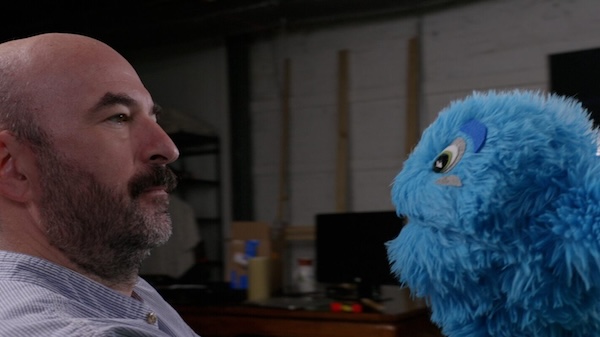Doc Talk: Stranger Than (Science) Fiction at the Boston Sci-Fi Film Festival
By Peter Keough
A pair of documentaries challenge the fantasies in the Boston Sci-Fi Film Festival
The Boston Sci-Fi Film Festival. At the Somerville Theatre, February 12-17.
The topic of AI dominates this year’s Boston Sci-Fi Film Festival, which now celebrates its 50th anniversary, making it the country’s oldest such event. Does their recognition of this threat suggest that the human spirit continues to resist the encroachment of the soulless forces of artificial intelligence that seek to dominate us? Or might it be a covert acknowledgement that the replicants have already won? The appearance of two non-fiction films in the program complicates the matter, since documentaries are a genre in which truth, authenticity, and transparency are, ostensibly, essential features.

A scene from Small Town Universe.
At first glance that does not pose a problem for Katie Dellamaggiore’s Small Town Universe (2024; screens February 12 at 8 p.m. The director will attend for a Q & A. ), which, if anything, would seem to be concerned with non-earthling and not artificial intelligence. It focuses on the huge radio telescope nestled like an ancient edifice from Ridley Scott’s Alien series amidst bucolic Appalachian splendor in Green Bank, West Virginia. Among the site’s many groundbreaking projects since its founding in 1956 is its pioneering work in the search for extraterrestrial intelligence (SETI).
Though venturing at times in speculating on those possibilities, Dellamaggiore grounds her film in examining the Green Bank community, for whom the telescope is such a major part of their lives. Not only is the instrument the town’s biggest employer, but it has also imposed a blackout on all radio signals that might interfere with its scanning of the skies. That means, theoretically, no Wi-Fi or cell phones, so the area has attracted a number of new residents who suffer from Electrohypersensitivity (EHS), a syndrome in which radiation from electronic devices causes a variety of unpleasant symptoms (shades of Todd Haynes’s 1995 film Safe). Dellamaggiore profiles one such sufferer, who has been forced, because of her condition, to move from her home in New York and live apart from her husband in a trailer in Green Bank.
Other subjects include locals whose life has been changed, mostly for the better, by the observatory. They range from a teenage girl whose interest in astronomy was nurtured after she was mentored by a scientist at the site to a former engineer, now retired, who moved to the town decades ago to help build the telescope, fell in love with the area, and never left. However, this idyllic scenario now appears threatened by Federal budget cuts. Those who depend on the telescope for their livelihoods and security wait anxiously for a final determination.
Meanwhile, it would seem no place could be further removed from the dangers of AI than Green Bank with its ban on Wi-Fi, electronics, and all such encroachments from the internet – the so-called National Radio Quiet Zone. But not so fast. In one scene a local tours the neighborhood and passes a subsidiary installation that had been closed down by the Navy. “It’s almost an entirely educational telescope right now,” he says. “It’s a project called Skynet.” He quickly adds, “No relationship to the Terminator movies, by the way.”
Hmm. A bit of a glitch in the matrix there?

Man communicating with AI (in the form of a blue sock puppet) in Daniel Freed’s I Hope This Helps!
For a more direct (if tongue-in-cheek) assessment of the AI threat you might check out Daniel Freed’s I Hope This Helps! (2024; screens February 16 at 1 p.m.). Grimly deadpan, Freed consults Google’s Bard AI chatbot for advice on writing up a treatment for a documentary that will explore how to defeat AI in the upcoming human-machine war. He and the bot brainstorm together and decide that the best way to personify AI would be as a blue furry sock puppet speaking with a female British accent.
As they confer, and as Freed realizes that he will never obtain the services of Benedict Cumberbatch in his proposed documentary nor be able to raise via bake sales the billions, if not trillions of dollars needed in a human-machine war, the purpose of the project switches to coming up with ways of promoting a more user-friendly, unthreatening image of AI. Though occasionally silly — via goofy jingles, animation and banter — Freed’s film archly demonstrates how slippery, deceptive, and irresistible the AI tide might be. And how, even given its inhumanity, it might be a more appealing alternative to the human sludge that poses a more urgent threat to all we value and depend on to preserve our humanity. Freed will take part in a Q & A after the screening.
Peter Keough writes about film and other topics and has contributed to numerous publications. He had been the film editor of the Boston Phoenix from 1989 to its demise in 2013 and has edited three books on film, most recently For Kids of All Ages: The National Society of Film Critics on Children’s Movies (Rowman & Littlefield, 2019).
Tagged: "I Hope This Helps!", "Small Town Universe", Daniel Freed, Katie Dellamaggiore
